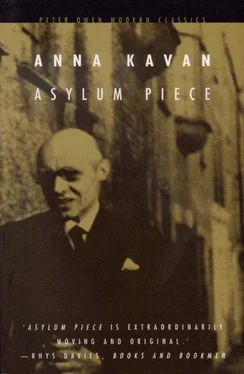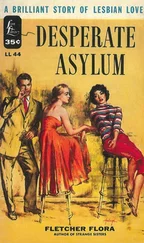She hears footsteps approaching and goes out into the hall.
A middle-aged English lady is waiting for the door to be opened. She is rather tall, rather large, and wears a mauve knitted dress that clings to her solid figure. Her faded hair is encircled with a bandeau of brown tulle which gives her an air that somehow contrives to be both impressive and slightly comic. She has the intensely respectable, intensely reserved look so characteristic of a certain old-fashioned type of Englishwoman abroad. One would expect to find her in a pension at Mentone, making tea in her bedroom over a spirit lamp, or perhaps painting precise little water-colours with a good deal of ultramarine. To-day is one of her good days. There is nothing at all in her appearance to suggest the moods of suicidal depression which are the cause of her presence at ‘La Pinède’.
‘Good-morning, Miss Swanson,’ says the smiling attendant in careful English, as she unlocks the door.
Miss Swanson answers and smiles in her remote way and goes out into the sun. After the shadows indoors the bright light is like a blow and she stops to put on the dark spectacles that she carries about in her bag. In front of her, in the middle of the asphalted private road, is a round bed full of succulent looking cannas; behind, to the right and left, is the pinewood from which the house takes its name. When she has adjusted her glasses Miss Swanson puts up a linen sunshade lined with green and walks slowly along the middle of the roadway that leads both to the main building and to the workroom for which she is bound.
As she goes, she has, from some distance away, a clear view of what is happening ahead. From time to time, at irregular intervals, singly or in small groups, figures emerge from the white balconied house and walk towards the atelier. All of them, in passing, pause for a few seconds beside a small, solitary girlish form under a clump of trees: the distant girl in her gay summer frock seems to have some piece of news which she is imparting to each one in turn.
The woman with the sunshade watches this procedure intently, screwing up her eyes behind their dark screens. The contraction of her eyes seems to indicate anxiety or disapproval — perhaps both. She begins to walk faster.
Soon she comes within speaking distance of the girl who is now alone, half sitting on an iron table under the trees. She is so small boned and slight, her body is so immature looking, that at a first glance one would take her for a child of about fifteen. It is hard to believe that she is actually a married woman when she calls out to her friend:
‘My husband’s come! He’s with the doctors now. As soon as he’s finished with them he’s going to take me out for the day.’ She jumps up and seizes Miss Swanson’s arm impulsively, shaking back her soft, fluffy hair and exclaiming: T told you he’d come, didn’t I? You didn’t believe me, but you see I was right all the time!’ She tilts her head and laughs rather aimlessly, glancing up at the elder woman who, for her part, looks down gravely into the pretty, childish, undisciplined face which seems to lack some co-ordination with its receding chin, its large, slightly prominent blue eyes.
‘How nice for you, Freda,’ she says, non-committal.
The lukewarm tone disappoints the other who pouts and moves a few petulant steps away, putting a space between the two of them.
‘You don’t sound a bit pleased,’ she complains in an aggrieved tone.
Miss Swanson advances and pats her on the shoulder.
‘Gracious, how thin you are, child!’ she mutters to herself, feeling the bones under their inadequate coverings of silk and flesh. A thwarted maternal instinct in her has fastened upon this girl, her compatriot, who, like herself, is an exile, almost a prisoner, in this unhappy place. She feels possessive, protective, towards Freda; jealous of anyone who might come between them. ‘Of course I’m pleased that you’re happy,’ she goes on. ‘But I’m afraid for you — that things will be worse for you afterwards — that you’ll feel lonelier than ever when your husband has gone.’
‘But he’s not going!’ cries Freda triumphantly. ‘He’s going to stay at the hotel by the lake.’
‘All the same, he’ll have to go back to England sometime.’
‘Then he’ll take me with him — I’ll persuade him — you’ll see. I’m quite well now, anyhow.’
The childish face is all smiles and Miss Swanson has not got the heart to refrain from smiling back in return. But she says nothing, and as it happens she is spared the necessity for words, because at that moment Mr. Rushwood comes out on to the steps of the clinic. He is very much older than his wife — perhaps more than twice her age — the last man in the world one would expect her to marry, for his face is serious, repressive, almost stern, under his grey hair. He approaches stiffly in the sunshine, walking with rather a wooden gait on account of an old war wound in the right leg. Freda introduces her friend, and he smiles like a schoolmaster, without warmth. His voice, too, is the voice of a master or of a clergyman, authoritative and cool.
‘Well, what did the doctors say? Did they tell you how good I’ve been?’ Freda is asking, clinging on to his arm and beaming at him.
But he, without answering the question, advises her to go and fetch her hat and bag as the car will arrive in a moment.
She runs off, like a docile child, and the elders are left together in the shade of the trees. Neither speaks. Mr. Rushwood stand stiffly by the table with an expressionless face. He is preoccupied; and a little embarrassed, too, at being left alone with this stranger who, though she looks quite conventional, may at any moment display some disturbing eccentricity. Miss Swanson surveys him with eyes that, in spite of everything, are shrewd enough behind the concealing black lenses. She does not seem to find reassurance in his aspect. Presently she puts up the sunshade which she has folded during the conversation with Freda, and starts to move off. But then a sudden impulse, very rare in her restrained spinster’s heart, makes her turn back and address the uncompromising man.
‘Mr. Rushwood, will you allow me to say something which I really have no right to say? You may quite well tell me that your wife’s future is no business of mine, and I can only answer that nothing but my very genuine affection for her would induce me to interfere in matters which do not concern me. During the last few weeks I have come to know Freda very well, she has confided in me, and I understand her character. Perhaps, if you will forgive my saying so, I understand her even better than you do. Of course I don’t know what plans you have made for her, but, Mr. Rushwood, I do beg you most earnestly to consider very carefully whether this is the right place for her — whether it would not be better to take her away from an environment where she is always lonely and sad and where she is bound to see and hear things which would be shocking to any young girl and must be especially so to one so sensitive and highly-strung as she is. If you leave her here when you go I am really afraid of what may happen to her — I am really afraid she will break her heart.’
It is the proof of Miss Swanson’s love that she is able to urge a course of action so contrary to her own wishes, for without Freda her existence at the clinic would loose its last shred of value.
The visitor has been growing slowly more uncomfortable during her long speech which, though spoken in a perfectly quiet voice, strikes him as being charged with dangerous emotion. For the first time he displays some sign of feeling, as, with a look half irritable, half apprehensive, he glances about as if in search of assistance. ‘This is insupportable!’ he thinks indignantly: ‘why doesn’t someone come and take the woman away?’ But there is nobody at all in sight and he is obliged to make a reply.
Читать дальше












